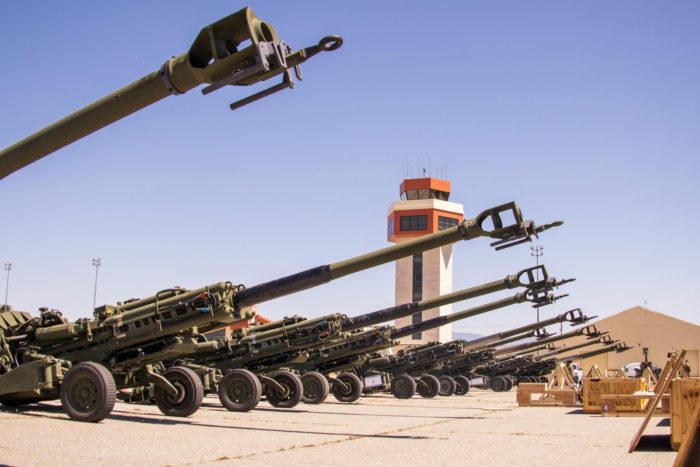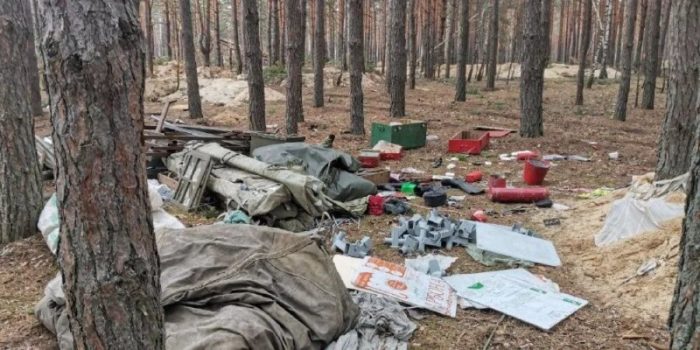Supplying the Ukrainian Army with heavy weapons would not cause World War Three. Russia has not retaliated against the NATO countries supplying Ukraine with weapons. First, because doing that is in accordance with international law. Second, because Russia is powerless to attack NATO.
For American servicemen based in California, it was an ordinary task. They simply loaded towed M777 howitzers and ammunition in the C-17 Globemaster transport aircraft. Everything is as usual… except the destination: the weapons go not to usual US allies such as Canada, but to Ukraine.
While the battle for Donbas is gaining momentum, the United States, Canada, and Australia are supplying Ukraine with more than 100 howitzers. Britain will donate missile-armed Stormer vehicles, the USA is sending hundreds of M113 APCs. Proposals are floated about tanks and self-propelled guns. An unusual flow of arms to a non-NATO country, isn’t it?
Still, some call for caution. Among them is German Chancellor Olaf Scholz, who warns about the risk of provoking Russia.
“I had said long ago that we must do everything possible to avoid direct military confrontation between NATO and the heavily armed nuclear superpower that is Russia,” Sholtz said, adding that there was no way to know when his country would be considered a party to the war.
His position was echoed by a part of German society and several other observers, who feared that arms supplies will somehow lead to a direct war between NATO and Russia. The most famous was an open letter from an opposing group of German cultural figures and opinion leaders. Still, the Bundestag voted in favor of providing weapons, albeit with some reservations.
Although Russia has consistently violated international law during the war against Ukraine, these rules could be a “red line” between supporting Ukraine and a direct war against Russia. And this law makes a clear difference between supplying arms and entering the war.
As Oona Hathaway, Executive Editor at Just Security law and policy forum, and Scott J. Shapiro, Director of the Center for Law and Philosophy at Yale Law School, concluded, arming Ukraine is not an act of war in the current international order, since states can support another country when the latter is unjustly attacked.
“Doing so violates no legal duty of neutrality. States would become parties to the international armed conflict between Russia and Ukraine if, and only if, they resort to armed force against Russia,” they stressed.
That’s why Türkiye, when selling its famous Bayraktar drones to Ukraine, forbade naming them “Turkish drones” – to avoid accusations of involvement in the war. As Minister of Foreign Affairs Mevlut Cavusoglu explained, after the purchase, the weapon became Ukrainian. Moscow has accepted this view, continuing close relations with Erdogan’s government and thus, de facto acknowledging no state of war with Türkiye.
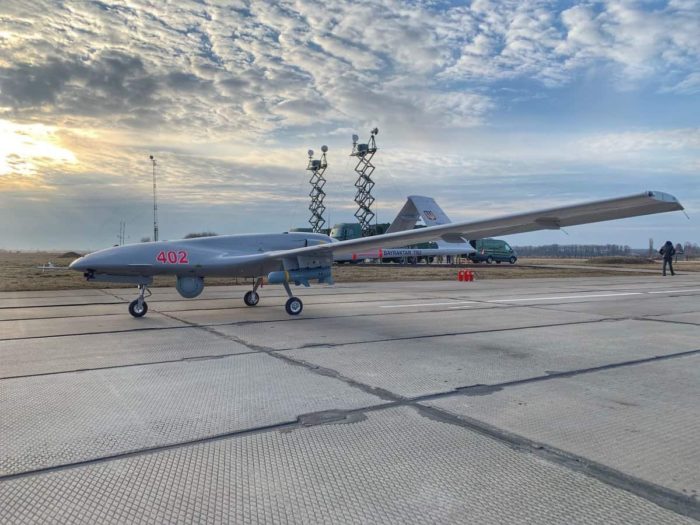
The UN takes a similar position. In 1974, it adopted Resolution 3314, giving a clear definition of direct military aggression. The main criterion of aggression in the resolution is the participation of the country’s armed forces: whether to invade, bomb, blockade ports, or shoot down aircraft. To be complicit in the attack would be to provide its territory, such as airfields for combat aircraft. The document says nothing about weapons.
For Germany or Britain, this means that they would not be involved in the war even in the event of aggression, not just fair defense.
The same rules also allowed Western countries to sell weapons to conflict zones. According to the Stiftung Wissenschaft und Politik (Berlin), during 2015-2020, Germany supplied arms to Saudi Arabia, the UAE, and Qatar, although these countries are intervening in Yemen. India, despite the conflict with Pakistan and tensions with China, buys military goods from France, Russia, the United States, South Korea, and Israel.
But what if Russia violates international law again?
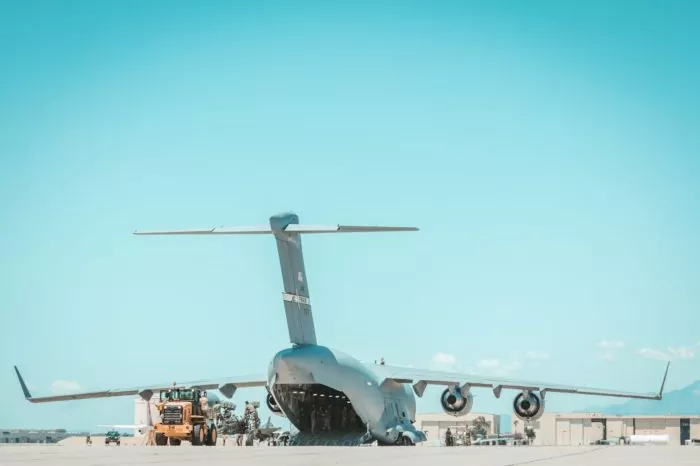
Some NATO countries have already provided heavy weapons to Ukraine, and Russia has not retaliated
Back in April, a European member of the Alliance made a life test on how Russia would react. It was Slovakia that sent S-300 anti-aircraft systems to Ukraine, giving sophisticated war machines with a range of tens of kilometers.
It was the first NATO country to go beyond man-portable weapons.
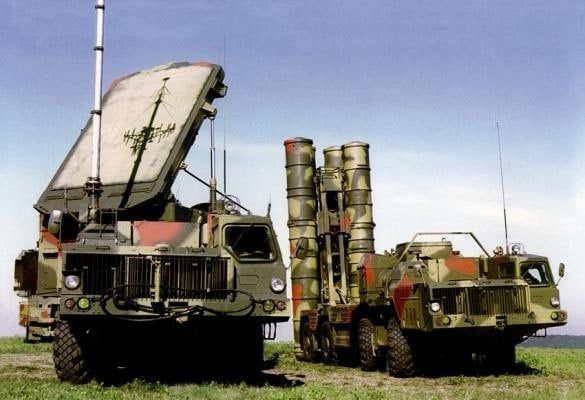
Having done so, Slovakia violated three Russian “do nots” at once:
- sent heavy weapons to Ukraine;
- made a transfer from NATO territory;
- gave Ukraine Soviet-made equipment (over which Russia proclaims the exclusive right to allow their sale).
All this despite the Kremlin threatening to bomb NATO weapon convoys.
The Czech Republic later took its own big step by agreeing to repair Ukrainian fighting vehicles. And the Prime Minister of Poland Mateusz Morawiecki announced tank deliveries to Ukraine. American howitzers are already being delivered to Ukraine.
All these cases have one similarity: a weak reaction of Russia. There were no announced attacks on NATO convoys. In the first case, the Kremlin could only claim the destruction of the S-300s, which Slovaks quickly refuted. The Russians responded to Poland only by accusing it of plans to seize Western Ukraine. No serious sanctions or provocations took place.
However, what if Russia finally decides to answer?
Russia is powerless to attack NATO, and the energy war will hit back
In case Russia starts a direct war against the West, observers name Baltic states (Lithuania, Latvia, and Estonia) as the most likely target.
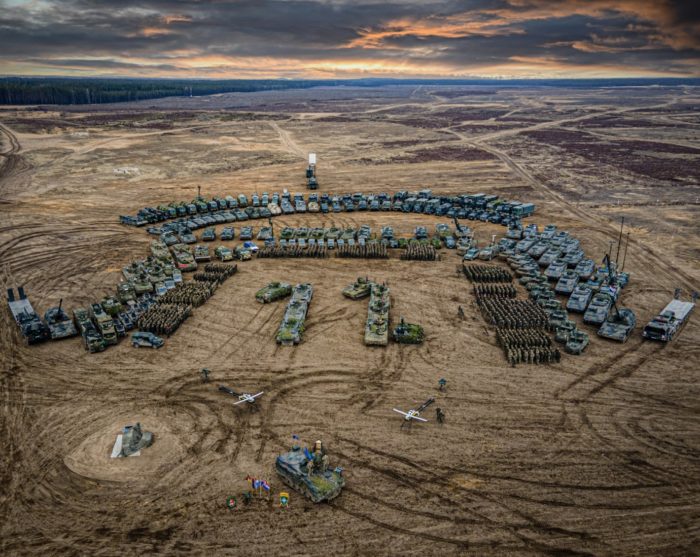
However, there is reason to not believe that Russia is capable of attacking the north flank now. Currently all of its most capable and equipped forces, including ground units of the Baltic Fleet, are bound by hostilities in Ukraine. In addition, according to the Ukrainian General Staff, the Russians have already lost more than 20,000 soldiers and a large number of vehicles.
With these conditions, the Kremlin will be just unable to quickly send tens of thousands of soldiers to the Baltics, equip them and form an invasion force – experts call the logistics of the Russian army “poor” and “terrible.” Not to mention that such a maneuver will leave the units in the Donbas without reinforcements, dooming them to defeat by Ukrainian forces.
Just remember how in March 2014, when Russia wanted to intimidate Ukraine, it concentrated 19 brigade or division-level military units on its borders. By comparison, in response to Finland’s decision to join NATO, Moscow has only been able to move anti-ship missile systems to its borders — a weak way to intimidate continental states.
It is the energy sector where Russia is really capable of hitting hard. It can stop the supplies of gas and oil to the European Union. Therefore, Germany is already preparing for a shutdown scenario.
But such a decision will prove painful because it hits the economy of Russia as well. In the case of gas or oil supplies to Europe, there is no force majeure, so the affected countries would go to the Stockholm Arbitration Court and win over Gazprom. Meanwhile, Europe will suffer, but the Kremlin will empty its own budget, as oil and gas sales to the EU last year brought in about 150 billion euros.
That’s why Ukraine, not Russia, is demanding a ban on Russian oil and gas for the EU – as a sanctions measure.
Although Russia has already cut off gas to two countries – Poland and Bulgaria – the formal reason was their refusal to pay in rubles. Even here the Kremlin chose two minor consumers, not daring to touch Germany, who also rejected the use of Russian currency.
That is why the Kremlin is threatening nuclear weapons, but doubts are being voiced
That may be the reason why in recent weeks, Russia has threatened to use the only real trump card it has: nuclear weapons. On April 25, country`s Foreign Minister Sergey Lavrov named the risk of its use as “serious and real, not to be underestimated”.
However, the US Department of Defense did not believe the threat, saying there was no reason for nuclear war. The British Deputy Secretary of Defense called them “bravado” and said that there was no real threat of escalation. “Nobody wants to see the Third World War”, as the Chinese foreign ministry quickly responded.
It should be noted that any nuclear actions will violate the Treaty on the Non-Proliferation of Nuclear Weapons, which is of great importance to the United States. “It would be a war crime on such a scale that neither he nor Russia will ever recover from its consequences. Definitely not in our life“, announced Victoria Nuland, US Under Secretary of State.

Thus, for Russia, it bears the risk of real isolation.
“The use of nuclear weapons against Ukraine will immediately turn even China’s attitude to Russia from neutral to hostile, revising their relations in various fields. The world will be forced to effectively punish the violator of the consensus by all available means; otherwise, containing the wave of new nuclear states will become impossible,” wrote Oleksiy Yizhak, head of the Central Region Research Sector at the National Institute for Strategic Studies, adding that a nuclear strike could not guarantee Ukraine’s capitulation to Russia.
Meanwhile, after these reactions, Lavrov backtracked, claiming that Russia is not threatening to use nuclear weapons and that Russia is not at war with NATO.
So while supplies are ongoing, the United States is already preparing a major step forward: working to provide Ukraine with systems for long-range strikes. After all, with the support of allies, Ukraine will be able to repel the attack on its own, preventing the war from escalating into a worldwide one.

Yuriy Prymachuk is a freelance journalist and editor from Ukraine. He received an MSc in the Institute of Journalism, Kyiv, interned in Radio Free Europe/Radio Liberty, worked as a journalist and editor in political and economic fields.
Related:
- Russia’s war destroys Ukraine’s economy, spurs global food and economic crisis
- Ukraine calls on Doctors Without Borders to evacuate Mariupol defenders
- Trophy dog abandoned by Russian army learning to obey commands in Ukrainian
- Not enough weapons, not enough Russian sanctions: opinion poll
- 12 reasons why the West should arm Ukraine, now
- Fallen pilots who saved the Ukrainian Air Force
- Breakthrough at Ramstein: NATO unites to help Ukraine defeat Russia
- Financing Putin’s war: Russian coal and gas exports to EU grow despite sanctions
- Russia’s war destroys Ukraine’s economy, spurs global food and economic crisis

